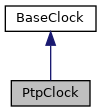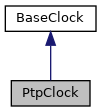POSIX dynamic clock id generator. More...
#include <ptp.h>


Public Member Functions | |
| bool | initUsingDevice (const std::string &device, bool readonly=false) |
| bool | initUsingIndex (int ptpIndex, bool readonly=false) |
| bool | isInit () const |
| clockid_t | clkId () const |
| int | getFd () const |
| int | fileno () const |
| int | ptpIndex () const |
| const std::string & | device () const |
| const char * | device_c () const |
| bool | setTimeFromSys () const |
| bool | setTimeToSys () const |
| bool | fetchCaps (PtpCaps_t &caps) const |
| bool | readPin (unsigned int index, PtpPin_t &pin) const |
| bool | writePin (const PtpPin_t &pin) const |
| bool | ExternTSEbable (unsigned int index, uint8_t flags) const |
| bool | ExternTSDisable (unsigned int index) const |
| bool | MaskClearAll () const |
| bool | MaskEnable (unsigned int index) const |
| bool | readEvent (PtpEvent_t &event) const |
| bool | readEvents (std::vector< PtpEvent_t > &events, size_t max=0) const |
| bool | setPinPeriod (unsigned int index, PtpPinPeriodDef_t times, uint8_t flags=0) const |
| bool | setPtpPpsEvent (bool enable) const |
| bool | samplePtpSys (size_t count, std::vector< PtpSample_t > &samples) const |
| bool | extSamplePtpSys (size_t count, std::vector< PtpSampleExt_t > &samples) const |
| bool | preciseSamplePtpSys (PtpSamplePrecise_t &sample) const |
 Public Member Functions inherited from BaseClock Public Member Functions inherited from BaseClock | |
| Timestamp_t | getTime () const |
| bool | setTime (const Timestamp_t &ts) const |
| bool | offsetClock (int64_t offset) const |
| float_freq | getFreq () const |
| bool | setFreq (float_freq freq) const |
| bool | setPhase (int64_t offset) const |
Static Public Member Functions | |
| static bool | isCharFile (const std::string &file) |
Detailed Description
POSIX dynamic clock id generator.
Create a dynamic clock id for a POSIX clock, that the application can use to fetch the PTP clock time and perform actions on PHC hardware.
- Note
- The dynamic clock id exists while the object exists. Do NOT delete the object while using the dynamic clock id.
- A network interface may have multiple PHCs
Member Function Documentation
◆ clkId()
| clockid_t PtpClock::clkId | ( | ) | const |
Get dynamic clock id
- Returns
- dynamic clock id or CLOCK_INVALID if not initialized
◆ device()
| const std::string & PtpClock::device | ( | ) | const |
Get POSIX device name
- Returns
- device name or empty string if not initialized
◆ device_c()
| const char * PtpClock::device_c | ( | ) | const |
Get POSIX device name
- Returns
- device name or empty string if not initialized
◆ ExternTSDisable()
| bool PtpClock::ExternTSDisable | ( | unsigned int | index | ) | const |
Disable PHC pin external events
- Parameters
-
[in] index pin index to enable
- Returns
- true for success
- Note
- Pin index should be in the range (0, PtpCaps_t.num_pins]
◆ ExternTSEbable()
| bool PtpClock::ExternTSEbable | ( | unsigned int | index, |
| uint8_t | flags | ||
| ) | const |
Enable PHC pin external events
- Parameters
-
[in] index pin index to enable [in] flags using the PTP_EXTERN_TS_xxx flags
- Returns
- true for success
- Note
- Pin index should be in the range (0, PtpCaps_t.num_pins]
- old kernel do not support PTP_EXTERN_TS_STRICT
◆ extSamplePtpSys()
| bool PtpClock::extSamplePtpSys | ( | size_t | count, |
| std::vector< PtpSampleExt_t > & | samples | ||
| ) | const |
Extended sample the PHC and system clock So caller can compare offset and frequancy
- Parameters
-
[in] count number of sample to measure [out] samples taken by kernel
- Returns
- true for success
- Note
- old kernel do not support
◆ fetchCaps()
| bool PtpClock::fetchCaps | ( | PtpCaps_t & | caps | ) | const |
Get PTP clock capabilities
- Parameters
-
[out] caps capabilities
- Returns
- true for success
◆ fileno()
| int PtpClock::fileno | ( | ) | const |
Get file description
- Returns
- file description
◆ getFd()
| int PtpClock::getFd | ( | ) | const |
Get file description
- Returns
- file description
◆ initUsingDevice()
| bool PtpClock::initUsingDevice | ( | const std::string & | device, |
| bool | readonly = false |
||
| ) |
Initialize a POSIX clock based on its device name
- Parameters
-
[in] device name [in] readonly open clock to read only
- Returns
- true if device is a POSIX clock
◆ initUsingIndex()
| bool PtpClock::initUsingIndex | ( | int | ptpIndex, |
| bool | readonly = false |
||
| ) |
Initialize a PTP clock based on its index
- Parameters
-
[in] ptpIndex clock PTP index [in] readonly open clock to read only
- Returns
- true if network interface exists
◆ isCharFile()
|
static |
Check file is a char file
- Parameters
-
[in] file name to check
- Returns
- true if file is char device
- Note
- function will follow a symbolic link
◆ isInit()
| bool PtpClock::isInit | ( | ) | const |
Is object initialized
- Returns
- true if PTP clock exist and object was successfully initialized
◆ MaskClearAll()
| bool PtpClock::MaskClearAll | ( | ) | const |
PHC clear all mask
- Returns
- true for success
◆ MaskEnable()
| bool PtpClock::MaskEnable | ( | unsigned int | index | ) | const |
PHC ebable single pin mask
- Parameters
-
[in] index pin index in mask to enable
- Returns
- true for success
- Note
- Pin index should be in the range (0, PtpCaps_t.num_pins]
◆ preciseSamplePtpSys()
| bool PtpClock::preciseSamplePtpSys | ( | PtpSamplePrecise_t & | sample | ) | const |
Precise sample the PHC using PCI cross time stamp
- Parameters
-
[out] sample taken by kernel
- Returns
- true for success
- Note
- old kernel do not support
◆ ptpIndex()
| int PtpClock::ptpIndex | ( | ) | const |
Get PTP index
- Returns
- index or NO_SUCH_PTP if not initialized or clock do not have PTP index
◆ readEvent()
| bool PtpClock::readEvent | ( | PtpEvent_t & | event | ) | const |
Read single external event
- Parameters
-
[out] event retrieved event
- Returns
- true for success
◆ readEvents()
| bool PtpClock::readEvents | ( | std::vector< PtpEvent_t > & | events, |
| size_t | max = 0 |
||
| ) | const |
Read external events
- Parameters
-
[out] events retrieved events [in] max maximum number of events to read
- Returns
- true for success
- Note
- the maximum is trunced to 30 events
◆ readPin()
| bool PtpClock::readPin | ( | unsigned int | index, |
| PtpPin_t & | pin | ||
| ) | const |
Read PHC clock pin current functional state
- Parameters
-
[in] index pin index to read [out] pin hardware functional state
- Returns
- true for success
- Note
- Pin index should be in the range (0, PtpCaps_t.num_pins]
◆ samplePtpSys()
| bool PtpClock::samplePtpSys | ( | size_t | count, |
| std::vector< PtpSample_t > & | samples | ||
| ) | const |
Sample the PHC and system clock So caller can compare offset and frequancy
- Parameters
-
[in] count number of sample to measure [out] samples taken by kernel
- Returns
- true for success
◆ setPinPeriod()
| bool PtpClock::setPinPeriod | ( | unsigned int | index, |
| PtpPinPeriodDef_t | times, | ||
| uint8_t | flags = 0 |
||
| ) | const |
Set PHC pin period signal
- Parameters
-
[in] index pin index [in] times provides the times used for the period [in] flags using the PTP_PERIOD_xxx flags
- Returns
- true for success
- Note
- Pin index should be in the range (0, PtpCaps_t.num_pins]
- old kernel do not support flags
◆ setPtpPpsEvent()
| bool PtpClock::setPtpPpsEvent | ( | bool | enable | ) | const |
Enable or disable Linux pulse per second event
- Parameters
-
[in] enable flag
- Returns
- true for success
- Note
- Linux will create a pps device /dev/ppsN User can use the 'pps-tools' to use the device.
◆ setTimeFromSys()
| bool PtpClock::setTimeFromSys | ( | ) | const |
Set PHC time using the system clock
- Returns
- true for success
◆ setTimeToSys()
| bool PtpClock::setTimeToSys | ( | ) | const |
Set system clock using the PHC as source time
- Returns
- true for success
◆ writePin()
| bool PtpClock::writePin | ( | const PtpPin_t & | pin | ) | const |
Set PHC clock pin functional state
- Parameters
-
[in] pin hardware functional state
- Returns
- true for success
- Note
- Pin index comes from PtpPin_t!
- Pin index should be in the range (0, PtpCaps_t.num_pins]
The documentation for this class was generated from the following file:
- pub/ptp.h